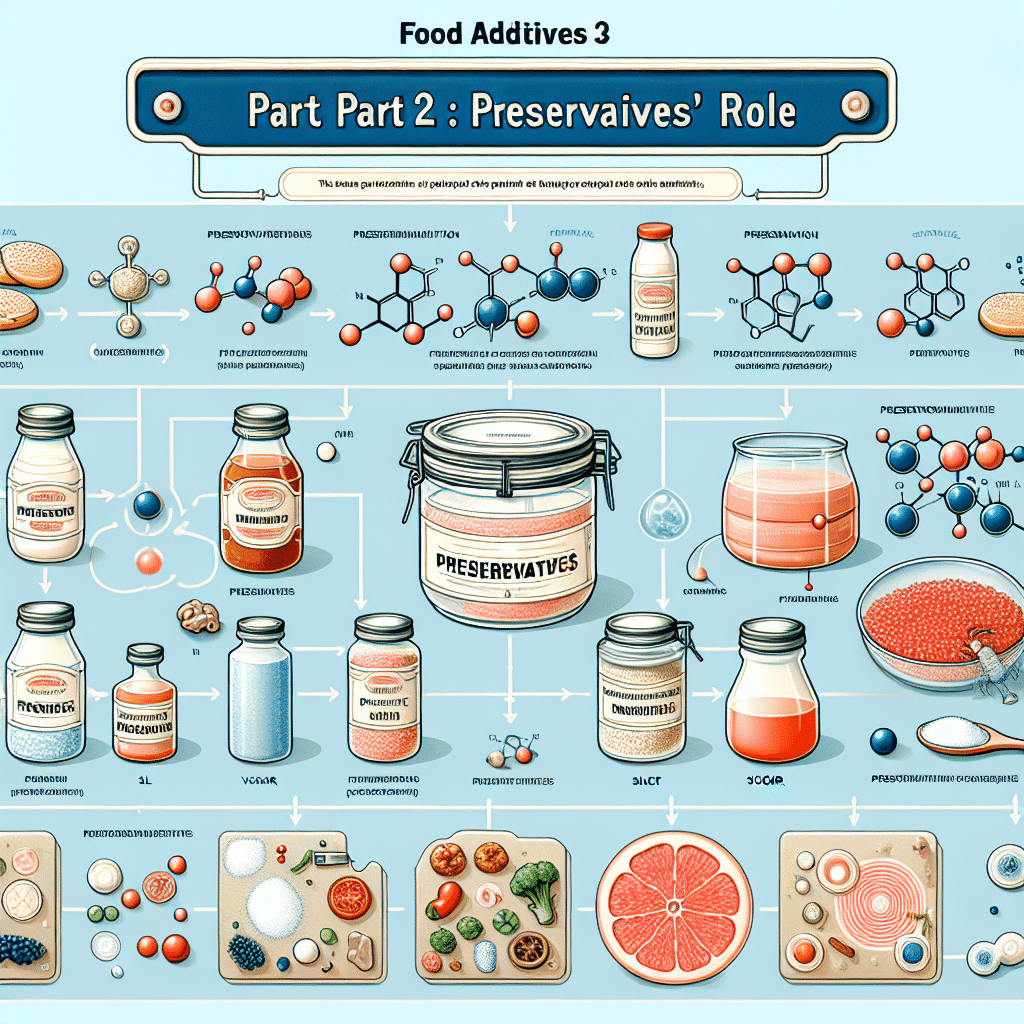Food Additives Part 2: Preservatives’ Role Discussed
-
Table of Contents
- Preservatives in Food: Understanding Their Crucial Role
- The Importance of Preservatives in Food
- Types of Preservatives
- How Preservatives Work
- Case Studies: The Effectiveness of Preservatives
- Debunking Myths About Preservatives
- Regulation and Safety of Preservatives
- Acceptable Daily Intake (ADI)
- Preservatives and Public Health
- Statistics on Foodborne Illnesses
- Conclusion: The Balanced Perspective on Preservatives
- Discover ETprotein’s High-Quality Protein Products
Preservatives in Food: Understanding Their Crucial Role

Food additives have been a topic of discussion and debate for many years, with preservatives often at the forefront of consumer concerns. However, these substances play a vital role in ensuring the safety, longevity, and quality of our food supply. In this second part of our series on food additives, we delve into the world of preservatives, examining their functions, benefits, and the science behind their use.
The Importance of Preservatives in Food
Preservatives are substances added to food to prevent spoilage caused by microorganisms such as bacteria, molds, and yeasts. They also help to maintain the food’s original taste, color, and texture. Without preservatives, many products would have a much shorter shelf life, leading to increased food waste and higher risks of foodborne illnesses.
Types of Preservatives
- Natural Preservatives: These include salt, sugar, vinegar, and certain herbs and spices that have been used for centuries to preserve food.
- Chemical Preservatives: These are synthetically produced and include substances like sodium benzoate, potassium sorbate, and sulfites.
How Preservatives Work
Preservatives work by inhibiting the growth of harmful microorganisms or by slowing down the oxidation process that leads to food spoilage. Some preservatives have antioxidant properties, while others are antimicrobial.
Case Studies: The Effectiveness of Preservatives
Several studies have demonstrated the effectiveness of preservatives in extending shelf life and ensuring food safety. For example, sodium benzoate has been shown to effectively inhibit the growth of yeast and mold in acidic foods like salad dressings and carbonated drinks. Similarly, sorbic acid and its salts are widely used in dairy products, baked goods, and snack foods to prevent mold growth.
Debunking Myths About Preservatives
Despite their benefits, preservatives are often misunderstood. Here are some common myths debunked:
- Myth: All preservatives are harmful to human health.
- Truth: Preservatives are rigorously tested for safety and are approved for use by regulatory agencies like the FDA and EFSA.
- Myth: Preservatives cause cancer.
- Truth: There is no conclusive evidence linking preservatives at levels used in foods to cancer.
Regulation and Safety of Preservatives
Food preservatives are subject to strict regulations to ensure their safety. Regulatory bodies such as the FDA in the United States and the European Food Safety Authority (EFSA) in the European Union evaluate the safety of preservatives through rigorous testing and risk assessment.
Acceptable Daily Intake (ADI)
The ADI is the maximum amount of a substance that can be consumed daily over a lifetime without posing a health risk. Preservatives must have an established ADI to be approved for use.
Preservatives and Public Health
Preservatives contribute significantly to public health by reducing the risk of foodborne illnesses. They help to ensure that foods remain safe to eat from the point of production to the moment they are consumed.
Statistics on Foodborne Illnesses
According to the Centers for Disease Control and Prevention (CDC), an estimated 48 million people get sick, 128,000 are hospitalized, and 3,000 die each year in the United States due to foodborne diseases. Preservatives play a crucial role in reducing these numbers by inhibiting the growth of pathogens in food.
Conclusion: The Balanced Perspective on Preservatives
In conclusion, preservatives are an essential component of the modern food supply. They extend shelf life, prevent spoilage, and protect against foodborne illnesses. While it is important to be mindful of the additives in our food, it is equally important to understand the science and regulations that ensure their safety. By maintaining a balanced perspective, consumers can make informed choices about the foods they eat.
Discover ETprotein’s High-Quality Protein Products
If you’re looking for premium protein products that align with your health and dietary needs, consider ETprotein’s offerings. Their extensive range of organic bulk vegan proteins and L-(+)-Ergothioneine (EGT) products cater to various industries, ensuring you receive the highest quality ingredients for your nutritional supplements and food products.
ETprotein’s commitment to non-GMO, allergen-free proteins with a neutral taste makes them an excellent choice for anyone seeking to enhance their diet with high-quality protein sources. Whether you’re involved in sports nutrition, weight management, or general health and wellness, ETprotein has a solution for you.
Contact ETprotein today to learn more about their products and how they can support your protein needs.
About ETprotein:
ETprotein, a reputable protein and L-(+)-Ergothioneine (EGT) Chinese factory manufacturer and supplier, is renowned for producing, stocking, exporting, and delivering the highest quality organic bulk vegan proteins and L-(+)-Ergothioneine. They include Organic rice protein, clear rice protein, pea protein, clear pea protein, watermelon seed protein, pumpkin seed protein, sunflower seed protein, mung bean protein, peanut protein, and L-(+)-Ergothioneine EGT Pharmaceutical grade, L-(+)-Ergothioneine EGT food grade, L-(+)-Ergothioneine EGT cosmetic grade, L-(+)-Ergothioneine EGT reference grade and L-(+)-Ergothioneine EGT standard. Their offerings, characterized by a neutral taste, non-GMO, allergen-free attributes, with L-(+)-Ergothioneine purity over 98%, 99%, cater to a diverse range of industries. They serve nutraceutical, pharmaceutical, cosmeceutical, veterinary, as well as food and beverage finished product distributors, traders, and manufacturers across Europe, USA, Canada, Australia, Thailand, Japan, Korea, Brazil, and Chile, among others.
ETprotein specialization includes exporting and delivering tailor-made protein powder and finished nutritional supplements. Their extensive product range covers sectors like Food and Beverage, Sports Nutrition, Weight Management, Dietary Supplements, Health and Wellness Products, and Infant Formula, ensuring comprehensive solutions to meet all your protein needs.
As a trusted company by leading global food and beverage brands and Fortune 500 companies, ETprotein reinforces China’s reputation in the global arena. For more information or to sample their products, please contact them and email sales(at)ETprotein.com today.












